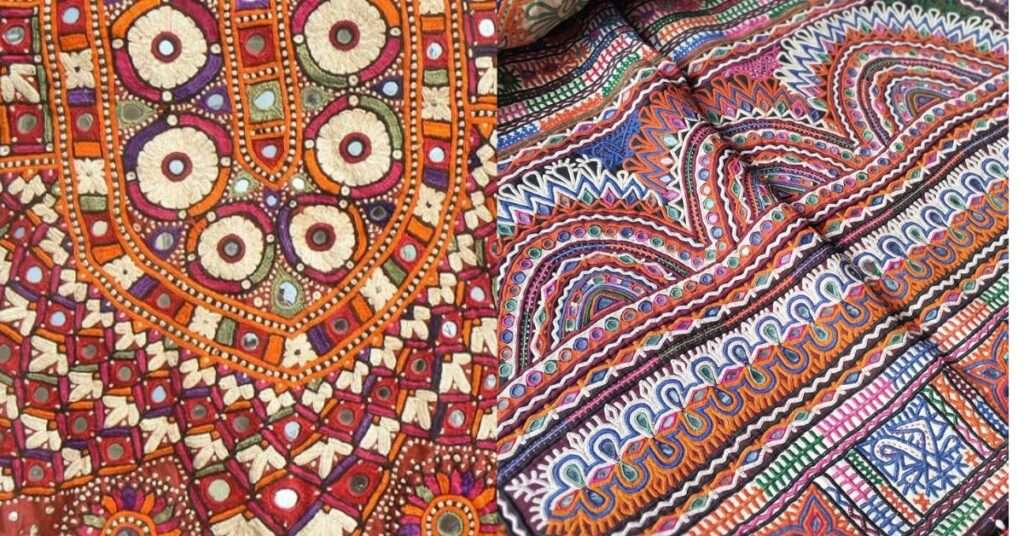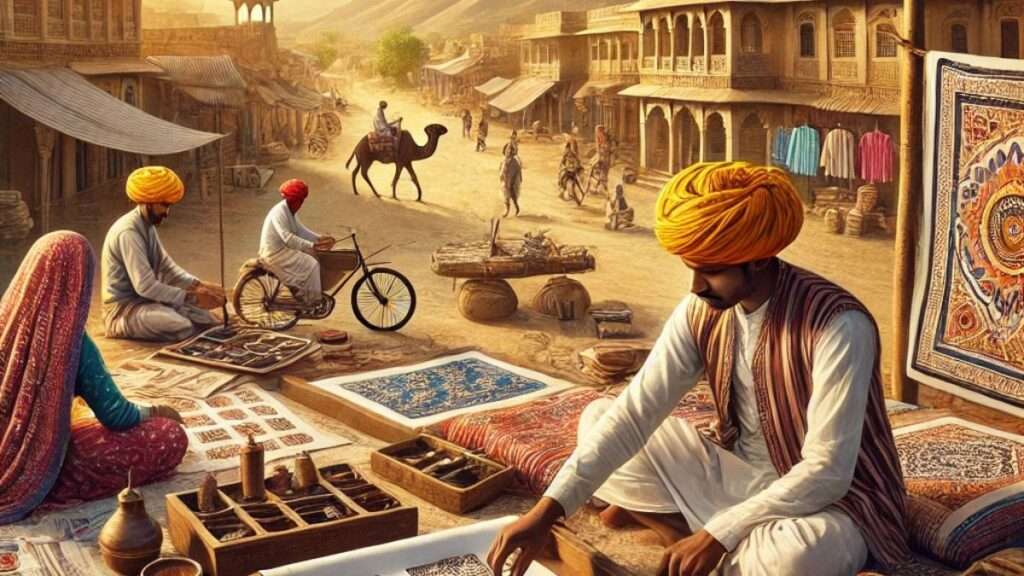
A tiny yet lively town in sun-drenched sands, Barmer is a miniature Rajasthan with all its colour, warmth and tradition.According to history, the 13th century founder of the district, Bahada Rao (popularly known as Bar Rao) gave the town its name – Barmer, i.e., the hill fort of Bar.
Once called Mallani (12th century A.D.) the present Barmer district, formed in 1949 upon the merger of Jodhpur state in the United States of Great Rajasthan, is a cluster of ancient paraganas – Mallani Shiv, Pachpadra, Siwana and the Chohatan area.
Although a barren land with harsh climate and rough terrain, Barmer is known for its rich crafts, dances and music. Once on the ancient camel trade route, the town is now the centre for wood carving, pottery, carpets, intricate embroidery work, block printed fabrics and multi-hued traditional costumes. Especially famous are the geometric ajrak prints in dark shades of red and blue, ideal for protection against the sun.
The most interesting part of a trip to Barmer is the journey through rural Rajasthan. The small villages with mud-walled houses decorated with delicate folk motifs and colourfully attired people on the way offer a fascinating sight. Every year in March, the desert town is at its colourful best during the exuberant Barmer festival. The festival is the best time to plan a visit to Barmer.
Contents
PRIME SITES
Barmer:
Perched on a rocky hill, the town has ruins of an old fort. Of interest are a temple dedicated to Balark (the Sun) and the ancient ruins of Juna Barmer. The three Jain temples, an inscription of 1295 A.D. and a massive pillar in the hall of the largest temple of Maharaja Kula Sri Samanta Sinha Deva, a ruler of Bahadmera (now, Barmer) are also worth a visit.
Kiradu:
Situated on the foot of a hill near village Hathma in Barmer tehsil is Kiradu.The inscription dating back to 1161 A.D. reveals that the place was called Kiratkoop and had once been the capital of Punwars. The ruins of five ancient temples – one dedicated to Lord Vishnu and other four dedicated to Lord Shiva, are of interest to archaeologists and art lovers, alike. The biggest of these temples is the Someshwar Temple.
Khed:
Rao Siha, the founder of the Rathore clan alongwith his son (Asthanji) conquered Khed from the Guhil Rajputs and planted the standard of the Rathores. An old Vishnu temple of Ranchhrji is surrounded by a crumbling wall and an image of Garuda (the eagle) at the gate guards the complex. Other temples nearby include temples of Brahma, Bhairav, Mahadev and a Jain temple.
Jasol:
Once a principal state of Mallani, this ancient village has got its name from the descendants of a Rathore sub-clan. A Jain temple and a Hindu temple are worth visiting. The Hindu temple is ornamented with fine sculptures which were brought from a Jain temple of Lord Mahaveer.
Meva Nagar:
Once called Viranipur, this 12th century village lies on the slope of a hill called Nagar-ki-Bhakarian, 9 km away from Baletra. The village has three Jain temples. The biggest of these is the one dedicated to Nakoda Parsvanath. A Vishnu temple is also worth visiting.
GARDENS AND PARKS
Mahaveer Park:
Mahaveer Park is a beautifully laid out park with a tiny museum housing ancient stone carved statues.
Safed Akhara:
(Sidheswara Mahadev Temple Complex) is a tiny yet pretty garden near Barmer. Temporary accommodation and cooking facilities are available.
Neemari:
Neemari is another picturesque garden on chohatan route, 23 km away from Barmer. An old swimming pool is an attraction.
Shopping:
A veritable shopper’s paradise, Barmer is treasure trove of vibrantly coloured embroidery with excellent mirror work. Also famous are beautifully embroidered fabrics and pouches often patterned with tiny mirrors. Traditional rugs, blankets, shawls, carpets, ‘Pattius’ Dari in typical Barmer colours and weave are a speciality of the district.
The shopping spots include the tiny shops along the narrow lanes of the colourful and lively Sadar Bazar.
FESTIVE FUN
Tilwara Cattle Fair (March-April) :
A major cattle fair lasting a fortnight, held in village Tilwara.
Nakoda Parasvanath (Dec.-Jan):
The festival held in Mevanagar village commemorating the birth anniversary of Parasvanath.
Veeratara Mela:
Held at Veeratara (12 km from village Chohatan) the fair venerates goddess Vakaldevi and is held thrice a year in the month of Chaitra, Bhadrapada and Magha.
Khed Fair (Aug.-Sep.):
A big religious fair held on Purnima (full moon) in village Khed.
Also Read – Rajasthan ki Hastkala : An Art Lover’s Paradise 2023
TRAVEL INFORMATION HOW TO GET THERE
Here’s how you can get to Barmer:
By Air:
The nearest airport is Jodhpur Airport, located approximately 200 km away. From Jodhpur, you can hire a taxi or take a bus to reach Barmer.
By Train:
Barmer has its own railway station, well-connected to major cities like Jodhpur, Jaipur, Delhi, and Ahmedabad. Regular trains such as the Barmer Express and Thar Link Express serve the region.
By Road:
Barmer is well-linked by road through NH-68.
- From Jodhpur: ~200 km (4-5 hours)
- From Jaipur: ~550 km (9-10 hours)
- From Ahmedabad: ~430 km (8 hours)
Rajasthan State Road Transport Corporation (RSRTC) buses and private buses operate regularly to Barmer. Alternatively, you can drive your own vehicle for a scenic journey.
Local Transport:
Once in Barmer, you can explore the town using auto-rickshaws, taxis, or rental cars.
Barmer’s accessibility makes it a perfect destination to experience the charm of Rajasthan’s desert landscape.
Accommodation – Where to stay
Barmer offers a variety of accommodation options catering to all budgets, from luxury hotels to budget-friendly stays. Here’s a guide to help you decide where to stay:
Luxury Hotels and Resorts
For a comfortable and premium experience, these options are ideal:
- Sanchal Fort: A heritage-inspired luxury hotel with modern amenities, a swimming pool, and desert views.
- The Desert Palace: Known for its hospitality and spacious rooms, offering a royal stay amidst the Thar Desert.
Mid-Range Hotels
For a balanced mix of comfort and affordability:
- Hotel Kailash International: Offers well-furnished rooms, great dining options, and excellent service.
- Hotel Madhav Paradise: A popular choice with clean rooms and convenient access to Barmer’s attractions.
Budget Stays
For travelers seeking economical options:
- Hotel Rishab: Budget-friendly accommodation with decent amenities.
- Daksh Hotel: Known for its affordable pricing and central location.
Guest Houses and Homestays
Experience local hospitality with these options:
- Desert Homestays: Traditional Rajasthani-style accommodations that offer an authentic desert experience.
- Family-run Guesthouses: Available in and around Barmer town for budget-friendly, personalized stays.
Tips for Booking
- Book in advance, especially during the tourist season (October to March).
- Check reviews on platforms like Google, TripAdvisor, or Booking.com to ensure quality.
- Some resorts offer cultural programs, desert safaris, and traditional Rajasthani cuisine, making them great for an immersive experience.
Conclusion
In conclusion, Barmer stands as a vibrant testimony to Rajasthan’s rich cultural heritage and artistic brilliance. From its exquisite wood carving and hand block printing to the enchanting melodies of traditional folk music, Barmer is a treasure trove for art and craft enthusiasts. Visiting this desert gem in 2025 offers a unique opportunity to witness the seamless blend of tradition and innovation that defines its craftsmanship. Whether you’re an avid traveler, a cultural explorer, or an admirer of fine artistry, Barmer promises an unforgettable experience. Immerse yourself in its charm and take home the essence of Rajasthan’s timeless culture.
FAQ’S
What is Barmer famous for?
Barmer is renowned for its traditional handicrafts, including embroidery, wood carving, pottery, and vibrant folk art. The region’s artisans are celebrated for preserving Rajasthan’s cultural heritage through their unique crafts.
What types of crafts can be found in Barmer?
Barmer offers a variety of crafts, such as: Intricate embroidery work,
Hand-carved wooden furniture, Colorful Rajasthani pottery, Folk paintings and murals and Traditional block printing textiles etc.
Are there any cultural festivals in Barmer?
Yes, the Barmer Thar Festival and Camel Festival are popular cultural events showcasing traditional music, dance, and crafts of the region. These festivals are a great way to experience Barmer’s vibrant culture.
How can tourists explore Barmer’s art and crafts?
Tourists can visit artisan villages, craft fairs, and local markets to witness the creation of crafts firsthand. Guided cultural tours are also available to learn about Barmer’s artistic heritage.
Where can I buy authentic Barmer handicrafts?
You can buy Barmer handicrafts from local markets like Sadar Bazaar and artisan workshops. Some online platforms and exhibitions in Rajasthan also showcase these crafts.
What is special about Barmer embroidery?
Barmer embroidery is known for its mirror work, vibrant colors, and traditional patterns inspired by local flora and fauna. This art form is often used to create decorative items like cushion covers, wall hangings, and apparel.

